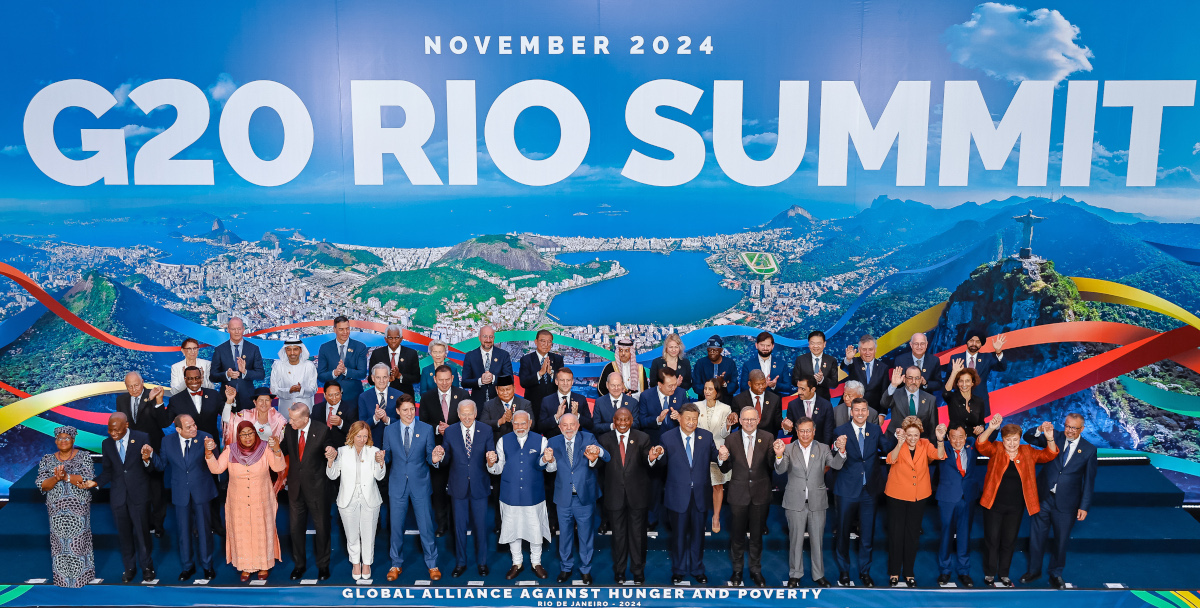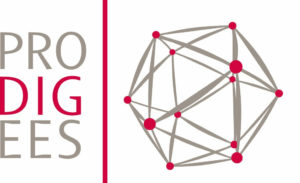 © Palácio do Planalto on flickr, Photo: Ricardo Stuckert/PR
© Palácio do Planalto on flickr, Photo: Ricardo Stuckert/PR
In November 2024, Brazil concluded its G20 presidency with the handover to South Africa. Just one week before the G20 Leaders‘ Summit in Rio de Janeiro on 11-12 November 2024, think tanks and research organisations from around the world gathered for the Think20 (T20) Summit. They took stock of the uptake and implementation of the policy advice they provided to the G20 throughout the year. This blog post provides an overview of key discussions at the T20 Summit with a focus on the priorities under Brazil’s G20 presidency. It analyses to which extent Brazil has continued initiatives of India’s G20 presidency in 2023, and shares an outlook on the potential approach of the South African presidency in 2025.
The world is experiencing global power shifts towards multipolarity amid polycrisis. While cooperation is indispensable to address global challenges, formal multilateralism is facing deadlocks. These deadlocks have opened up the rise of informal plurilateral settings, such as the G20. However, they have also fuelled the fragmentation of the global governance system with an increasing number of new institutions and agreements; it is now more difficult to coordinate cross-border policy interventions effectively, and scarce resources are subject to competition.
Global cooperation will become more challenging. The 2024 “super-election year” has reinforced the shift towards extreme-right and populist governments in several G20 member countries. Geopolitical tensions are accompanied by a rise in security and military spending. Meanwhile, with just six years remaining, progress toward achieving the Sustainable Development Goals (SDGs) remains inadequate. The re-election of Donald Trump as President of the US is likely to aggravate shortcomings in working towards the achievement of the SDGs, especially in its climate and environmental dimensions. The year 2024 has also witnessed the highest number of wars and conflicts in decades with all its humanitarian costs.
Amid these complexities, the Brazilian G20 presidency has prioritised countering the fragmentation of the international systems and bloc-building, to strengthen formal multilateralism. Brazil has explicitly advocated for aligning the G20 processes with the UN system in combination with a reform of global governance. Under the motto “Building a just world and a sustainable planet”, three main priorities were i) fighting hunger, poverty and inequality (including social and financial inclusion, international tax cooperation and food security), ii) energy transitions and sustainable development (social, economic, and environmental), and iii) global governance reform, in particular multilateral financial institutions.
These priorities also featured prominently in the proceedings of the Think20 (T20) engagement group that brings together leading think tanks and research institutions to provide research-based policy recommendations to the G20 Sherpa and Finance tracks. The Think20 has a mandate to provide evidence-based policy advice and serve as the ‘ideas bank’ of G20.
Divided into six task forces, ranging from inequalities and climate action to the reform of the International financial architecture, trade, digital transformation and the strengthening of multilateralism, 155 experts from 121 organisations participated in the process. The T20 Communiqué delivered to the G20 leaders brought together the ideas of more than 350 policy briefs authored by about 1750 experts. Results were also incorporated into the G20 Social, where – for the first time in G20 history – representatives of all engagement groups came together. The G20 Social process also aimed to include the voices of groups that are often underrepresented in multilateral processes, including indigenous peoples, traditional communities, persons with disabilities or workers in the informal sector.
The call for international law, a UN-centered multilateral order, and global governance reform
Think tankers from the G20 countries see the risk that the world is moving into a system of fragmented, parallel orders. Against this background, international organisations, including the UN Security Council, require reform. In this context, the UN Summit of the Future and the resulting Pact for the Future were identified as milestones, as well as the meeting of G20 Foreign Ministers at the UN, the first meeting at this level directly at the G20-UN interface. Open to the participation of the 193 UN Member States, the meeting resulted in the adoption of the “Call to Action on Global Governance Reform”, reaching consensus on a call for reform of the UN, the World Trade Organisation (WTO), and the International Monetary Fund (IMF). The suggestion for wealthier countries to channel parts of their Special Drawing Rights (SDRs) at the IMF to developing economies has also been taken up in the G20 Rio de Janeiro Leaders’ Declaration.
Fighting inequality, hunger, and poverty as common ground
The agenda shows some continuity in the sequence of Southern-led G20 Presidencies – Indonesia (2022), India (2023), and Brazil (2024) – which put greater emphasis on development questions from the perspectives of mid- and low-income economies. Similar to previous G20 presidencies, Brazil tried to escape from geopolitical tensions by focusing on global partnerships for sustainable development (see also Lynders & Reiners, 2022; Dang, Lynders & Reiners, 2023).
In line with President Lula da Silva’s domestic priorities, and building on cooperation with the G7, the G20 presidency launched the Global Alliance against Hunger and Poverty and the G20’s endorsement of the Rio de Janeiro G20 Ministerial Declaration on International Tax Cooperation (including taxing the super-rich) in the G20 Leaders’ Declaration. The Global Alliance against Hunger and Poverty targets setbacks in achieving SDG 1 and 2 by supporting strategies of cash transfers, homegrown school feeding programmes, and improving access to microfinance. The G20 Ministerial Declaration on International Tax Cooperation, in turn, acknowledged the inequality of the tax system and defines progressive taxation and taxation of ultra-high-net-worth individuals as tools to reduce inequalities and strengthen fiscal sustainability. These milestones were not achieved without challenges, as Argentina’s president, Javier Milei, had initially opposed to back both plans.
Inclusivity and justice in climate and digitalisation
Climate action and energy transition are of particular importance for Brazil as the country prepares to host the UNFCCC COP30 in 2025. Building on the legacies of Indonesia’s and India’s G20 presidencies, Brazil linked the issue area to the reform agenda for multilateral institutions, including a Roadmap towards Better, Bigger and More Effective Multilateral Development Banks, aimed at supporting countries’ development and climate goals. Beyond that, the presidency introduced the Bioeconomy Initiative, introducing the topic for the first time in a widely accepted international document. The G20 reached a consensus on High-level Principles for Bioeconomy, which emphasize inclusion, equity, biodiversity conservation, and the promotion of sustainable consumption and production patterns.
The commitment to inclusion extends also to the field of digitalisation. The G20 Declaration highlights the transformative potential of digital technologies to reduce inequalities, underpinned by the principles of universal connectivity, cybersecurity, and digital literacy. Here, Brazil has built on India’s legacy of popularising the concept of digital public infrastructure (DPI). The UN Summit of the Future, which reached a consensus in the UN Global Digital Compact, provided a strong point of reference.
With the handover to South Africa for the G20 presidency in 2025, a four-year sequence of Southern-led G20 chairs is entering its final phase. Reflecting on the priorities of Indonesia, India, and Brazil, it is evident that development concerns have been uplifted in the G20 agenda with widened perspectives on recurrent themes such as trade and macroeconomics, digital transformation, climate and energy transitions, as well as the reform of global governance.
More South in global governance in 2025: South Africa chairs the G20, Brazil continues with BRICS+ and COP30
South Africa’s G20 priorities will evolve around the themes of ‘Fostering Solidarity, Equality and Sustainable Development’. As “High-level deliverables and priorities”, three areas have been communicated: 1) Inclusive economic growth, industrialisation, employment and reducing inequality, 2) Food security, 3) Artificial intelligence and innovation for sustainable development. It is also likely that South Africa will put a strong focus on national and regional development, as well as on the implementation of the SDGs and the African Union’s Agenda 2063. Another likely priority, linked to the concept of “solidarity”, is sustainable financing and addressing debt vulnerability.
Despite the legacy of four Southern-led G20 chairs, the conditions for a successful presidency of lasting impact are not easy. The re-election of US President Trump is likely to add disruption to the international system in 2025, and the US is the next country to take over the G20 presidency in 2026. However, in the T20/G20, also voices can be heard that combine these developments with hope for changes in the global order, and alternative global leadership. Brazil is set to play an important role here in 2025 as the country will host both the UNFCCC COP30 in Belém and the presidency of BRICS+. Bringing both agendas together – climate change and the rise of countries of the so-called Global South – is a worthwhile and difficult task as the group includes several countries whose economies rely heavily on the extraction of fossil fuels.
A visible feature of the changing system is the centre stage of rising powers in key global processes. However, these processes come with big challenges and while capacities are growing, they are not endless. To illustrate, Indonesia and India changed the sequence of their G20 presidencies because of Indonesia’s commitment to take over the ASEAN chairmanship in 2023. Similarly, Russia and Brazil swapped their BRICS+ presidency to make available resources needed for Brazil’s G20 presidency.
South Africa now faces the huge task of integrating African continental perspectives into the G20 agenda and keeping global commitment to sustainable development alive. The year 2025 will mark key milestones for global agreements, including the 10th year anniversary of the Paris Agreement, the 2030 Agenda for Sustainable Development, and the Addis Ababa Action Agenda. Further delays in implementing these agendas seem unaffordable – and yet, the political landscape is much less conducive for joint action than a decade ago.



Schreibe einen Kommentar